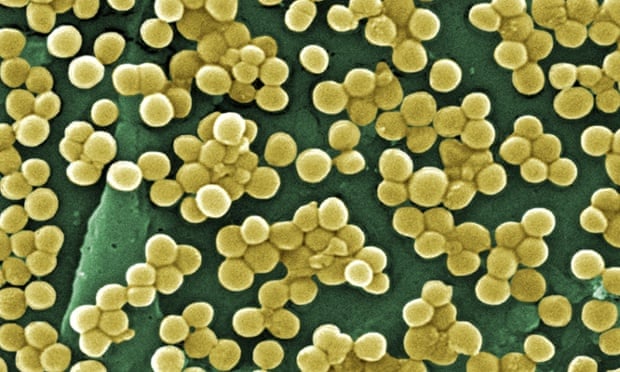 Scientists have discovered a new class of antibiotic using a revolutionary procedure hailed as a game changer in the hunt for medicines to fight drug-resistant infections. The antibiotic, called teixobactin, kills a wide range of drug-resistant bacteria, including MRSA and bugs that cause TB and a host of other life-threatening infections.
Scientists have discovered a new class of antibiotic using a revolutionary procedure hailed as a game changer in the hunt for medicines to fight drug-resistant infections. The antibiotic, called teixobactin, kills a wide range of drug-resistant bacteria, including MRSA and bugs that cause TB and a host of other life-threatening infections.
It could become a powerful weapon in the battle against antimicrobial resistance, because it kills microbes by blocking their capacity to build their cell walls, making it extremely difficult for bacteria to evolve resistance.
Antibiotic breakthrough could turn the tables in battle against superbugs
That Takeout Coffee Cup May Be Messing With Your Hormones
 Most people know that some plastics additives, such as bisphenol A (BPA), may be harmful to their health. But an upcoming study in the journal Environmental Health finds that entire classes of plastics—including the type commonly referred to as styrofoam and a type used in many baby products—may wreak havoc on your hormones regardless of what additives are in them.
Most people know that some plastics additives, such as bisphenol A (BPA), may be harmful to their health. But an upcoming study in the journal Environmental Health finds that entire classes of plastics—including the type commonly referred to as styrofoam and a type used in many baby products—may wreak havoc on your hormones regardless of what additives are in them.
The study's authors tested 14 different BPA-free plastic resins, the raw materials used to make plastic products, and found that four of them released chemicals that mimic the female hormone estrogen. That's not surprising.
Study: Early air pollution exposure linked to autism
 In a new study, researchers at the University of Pittsburgh found children with autism were more likely to have been exposed to certain air toxics during their mother's pregnancy and during the their first two years of life.
In a new study, researchers at the University of Pittsburgh found children with autism were more likely to have been exposed to certain air toxics during their mother's pregnancy and during the their first two years of life.
The paper's preliminary results have been accepted for review by the the American Association for Aerosol Research; it's one of the first times researchers have found a correlation between air pollution and autism rates.
Texas Ebola Patient Thomas Eric Duncan Has Died
Thomas Eric Duncan, the first person diagnosed with Ebola in the United States, died Wednesday morning, the Dallas hospital where he was being treated said.
Duncan, 42, was given the experimental Ebola drug brincidofovir, but his family said he was doing poorly and the hospital had downgraded his condition from serious to critical. When the family visited Tuesday with the Rev. Jesse Jackson, they declined to view him via video link because the last time had been too upsetting.
"What we saw was very painful. It didn't look good," said Duncan's nephew Josephus Weeks.
Turmeric may ward off dementia, heal the brain
 A new study by scientists in Germany has found a that a main ingredient in curry powder, the spice turmeric, can help the brain regenerate neurons and repair itself.
A new study by scientists in Germany has found a that a main ingredient in curry powder, the spice turmeric, can help the brain regenerate neurons and repair itself.
When researchers coated neural stem cells, isolate in petri dishes, in a chemical extracted from turmeric, the cells grew more prolifically into neurons than did control cells untouched by any foreign substances. The same turmeric-derived chemical compound had similar effects when injected into the brains of live rats.
Ebola cases could reach between 550,000 and 1.4 million by late January: CDC
Between 550,000 and 1.4 million people in West Africa could be infected with the Ebola virus by January 20, 2015, according to a report issued on Tuesday by the U.S. Centers for Disease Control and Prevention (CDC).
The top range of the estimate, 1.4 million, assumes that the number of cases officially cited so far, 5,864 according to the count kept by the World Health Organization, is significantly underreported, and that it is likely that 2.5 times as many cases, or nearly 20,000, have in fact occurred.
Are Routine Scans Causing Cancer?
 . A recent article in the Journal of American Medical Association noted that “a sizeable proportion of patients with advanced cancer continue to undergo cancer screening tests that do not have a meaningful likelihood of providing benefit.” Another published in the September 28, 2010 issue of Health Imaging noted that “as many as 30 percent of diagnostic imaging procedures are inappropriate or contribute no useful information.”
. A recent article in the Journal of American Medical Association noted that “a sizeable proportion of patients with advanced cancer continue to undergo cancer screening tests that do not have a meaningful likelihood of providing benefit.” Another published in the September 28, 2010 issue of Health Imaging noted that “as many as 30 percent of diagnostic imaging procedures are inappropriate or contribute no useful information.”
Elsewhere, statistics cited by the American College of Radiology (ACR) estimate that “60 million CT scans and 20 million nuclear medicine scans annually in the US might cause up to 40,000 fatal cancers.”
More Articles...
Page 31 of 233

 Health Glance
Health Glance






























